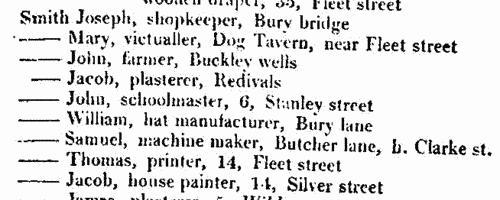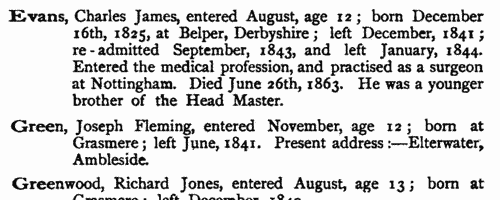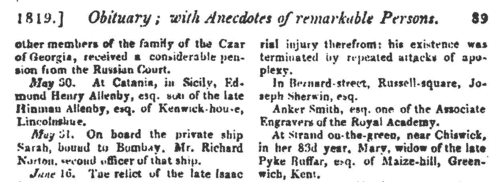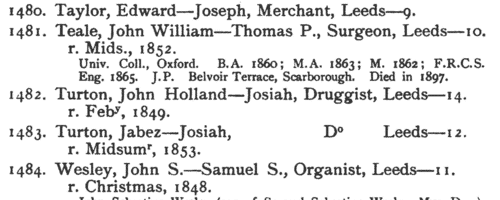Clayton Surname Ancestry ResultsOur indexes 1000-1999 include entries for the spelling 'clayton'. In the period you have requested, we have the following 1814 records (displaying 731 to 740): Single Surname Subscription | | | Buying all 1,814 results of this search individually would cost £10,436.00. But you can have free access to all 1,814 records for a year, to view, to save and print, for £100. Save £10,336.00. More... |
These sample scans are from the original record. You will get scans of the full pages or articles where the surname you searched for has been found. Your web browser may prevent the sample windows from opening; in this case please change your browser settings to allow pop-up windows from this site. Inhabitants of Bury in Lancashire
(1818)
Leigh's Directory of Bury and Rochdale lists gentry and traders in both towns and in surrounding areas. The sample scan is from the Bury listing.CLAYTON. Cost: £6.00.  | Sample scan, click to enlarge

| Wesleyan Methodist preachers
(1818)
A comprehensive list of Wesleyan Methodist ministers arranged by station and circuit in Britain, Ireland and abroad, was prepared each year at the church's annual conference. This includes supernumeraries and missionary preachers.CLAYTON. Cost: £6.00.  | Sample scan, click to enlarge

| Workers at Ewart's Cotton Mill, Manchester
(1818)
The minutes of evidence taken before the Lords Committee on the Cotton Factories Bill include a series of reports by medical men as to the general health of the mill workers in April 1818. For each factory there is a complete list of workers, giving full name, age, how long employed in a factory, health (in general terms, such as 'Good' or 'Sickly'), and any chronic disease or 'distortion', cause and duration - with slight variations from report to report. The physicians examined several hundred people each day, asking such questions as 'Have you any swellings or sores anywhere?', 'Are your limbs straight?', 'Have you a good appetite for food?', 'Do you conceive yourself to be in good health?', and all concluded that the health of the mill workers was good, and that the workers were cheerful. This is the report for Peter Ewart's cotton spinning factory in Manchester, 21 April 1818.CLAYTON. Cost: £6.00.  | Sample scan, click to enlarge

| Workers at McConnel & Kennedy's Cotton Mill, Manchester
(1818)
The minutes of evidence taken before the Lords Committee on the Cotton Factories Bill include a series of reports by medical men as to the general health of the mill workers in April 1818. For each factory there is a complete list of workers, giving full name, age, how long employed in a factory, health (in general terms, such as 'Good' or 'Sickly'), and any chronic disease or 'distortion', cause and duration - with slight variations from report to report. The physicians examined several hundred people each day, asking such questions as 'Have you any swellings or sores anywhere?', 'Are your limbs straight?', 'Have you a good appetite for food?', 'Do you conceive yourself to be in good health?', and all concluded that the health of the mill workers was good, and that the workers were cheerful. This is the report for McConnel & Kennedy's cotton spinning factory in Manchester, 21 April 1818.CLAYTON. Cost: £6.00.  | Sample scan, click to enlarge

| Workers at Mitchell, Hardie & Scott's Cotton Mill, Manchester
(1818)
The minutes of evidence taken before the Lords Committee on the Cotton Factories Bill include a series of reports by medical men as to the general health of the mill workers in April 1818. For each factory there is a complete list of workers, giving full name, age, how long employed in a factory, health (in general terms, such as 'Good' or 'Sickly'), and any chronic disease or 'distortion', cause and duration - with slight variations from report to report. The physicians examined several hundred people each day, asking such questions as 'Have you any swellings or sores anywhere?', 'Are your limbs straight?', 'Have you a good appetite for food?', 'Do you conceive yourself to be in good health?', and all concluded that the health of the mill workers was good, and that the workers were cheerful. This is the report for Mitchell, Hardie and Scott's cotton spinning factory in Manchester, 17 April 1818.CLAYTON. Cost: £6.00.  | Sample scan, click to enlarge

| Workers at Pollard's Cotton Mill, Manchester
(1818)
The minutes of evidence taken before the Lords Committee on the Cotton Factories Bill include a series of reports by medical men as to the general health of the mill workers in April 1818. For each factory there is a complete list of workers, giving full name, age, how long employed in a factory, health (in general terms, such as 'Good' or 'Sickly'), and any chronic disease or 'distortion', cause and duration - with slight variations from report to report. The physicians examined several hundred people each day, asking such questions as 'Have you any swellings or sores anywhere?', 'Are your limbs straight?', 'Have you a good appetite for food?', 'Do you conceive yourself to be in good health?', and all concluded that the health of the mill workers was good, and that the workers were cheerful. This is the report for Pollard's spinning mill in Manchester, 20 April 1818.CLAYTON. Cost: £6.00.  | Sample scan, click to enlarge

| Boys entering Sedbergh School
(1799-1819)
B. Wilson prepared this edition of the register of the Grammar School at Sedbergh in the West Riding of Yorkshire, published in 1895. Sedbergh school had three exhibitions at St John's College, Cambridge, and for the earliest years little more could be found about the pupils at the school than was recorded at St John's or other colleges. In 1700-1706 the first material from Sedbergh appears, but no more than lists of surnames. From 1746 onwards full names, or surnames and initials, are found for those boys who did not continue to university. It is only from 1820 onwards that the school register starts to give detail: month of entry, age, birthplace, and month of leaving. From then onwards Wilson was able to add more and more biographical detail, except, of course, for those boys in 1895 still at the school or with their careers yet ahead of them.CLAYTON. Cost: £4.00.  | Sample scan, click to enlarge

| Deaths, Marriages, News and Promotions
(1819)
Death notices and obituaries, marriage and birth notices, civil and military promotions, clerical preferments, general news and domestic occurrences, as reported in the Gentleman's Magazine. Mostly from England and Wales, but items from Ireland, Scotland and abroad. July to December 1819.
CLAYTON. Cost: £4.00.  | Sample scan, click to enlarge

| Deaths, Marriages, Bankrupts, Dividends and Patents
(1819-1820)
Death notices and obituaries, marriage and birth notices, bankrupts and dividends, and patents, as reported in the Monthly Magazine or British Register. Includes some marriages and deaths from Ireland, Scotland and abroad.
CLAYTON. Cost: £6.00.  | Sample scan, click to enlarge

| Boys entering Leeds Grammar School
(1820)
The admission books for Leeds Grammar School from 1820 to 1900 were edited by Edmund Wilson and published in 1906. The series of registers is almost complete for the period, there being in addition admission registers for the Lower (or Commercial) Department from 1856 to 1865, and lists of boys in the school in 1856, and in the Commercial Department in 1861. The entries are arranged by date or term of admission: a sequential number is given first, then surname, christian name, and, after a dash, father's christian name, occupation, and address; another dash, and then the age of the boy at admission, and often his year of leaving (with the abbreviation r. for 'removed' or 'left'). r.* means left without notice; (o) or S. or Stranger or Foreigner indicates a boy not on the foundation. The editor was unable to divine the meaning of the abbreviation (Q) or the asterisks prefixed to most entries in 1856 to 1860, but dutifully copies them into the text. In smaller type he then proceeds, where possible, to add some information about the boy's subsequent career.CLAYTON. Cost: £4.00.  | Sample scan, click to enlarge

|
Research your ancestry, family history, genealogy and one-name study by direct access to original records and archives indexed by surname.
|












